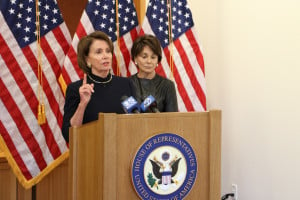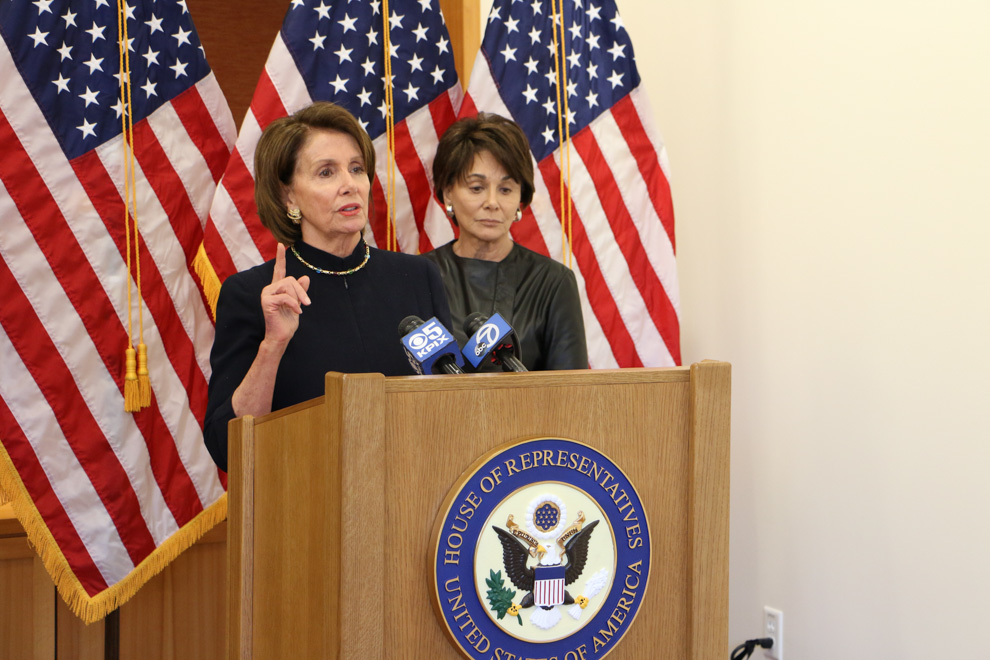Nancy Pelosi, U.S. House of Representatives Minority Leader, joined Silicon Valley leaders at Stanford on Tuesday for a closed forum to discuss Innovation Agenda 2.0, a Democratic plan that will promote American innovation, in part by pushing for immigration reform.

Of the 22 planks proposed in Innovation Agenda 1.0, immigration reform is the only plank that remains unaddressed. The agendas act as a Congressional call-to-action that outlines legislation needed to promote innovation.
Congresswoman Anna Eshoo hosted the forum with Congresswoman Zoe Lofgren and Stanford President John Hennessy in the Fry Gunn Building, nearly 10 years after Eshoo had hosted a similar forum at Stanford for Innovation Agenda 1.0.
Innovation Agenda 1.0 outlined five categories of concern for legislators: (1) “creating a new generation of innovators,” (2) “a sustained commitment to research and development,” (3) “promoting energy independence,” (4) “affordable broadband access for all Americans,” and (5) “small business tools for innovation.”
As an initiative under the first category, Congress passed the College Cost Reduction and Access Act in 2007, which increased financial aid and cut student loan rates.
Under the second category, Congress approved increased funding for the National Science Foundation, the National Institute of Standards and Technology and the Department of Energy’s Office of Science to create research opportunities.
Given the successes of the first agenda, Tuesday’s forum on Innovation Agenda 2.0 revealed a “universal expression of disappointment” that Congress has failed to reform immigration policy, according to Lofgren. She also heard “concern about the stratification in our economy.”
At the press conference, Eshoo emphasized that innovation and immigration are fundamental to the United States, as a nation not founded upon shared ethnicity or race, but upon common ideas.
“This is who we are,” Eshoo said. “This is what we are. And to tear at that very DNA is, in our collective view, something that is antithetical to who and what we are.”
The congresswomen did not offer any specific examples of how to address the issues raised in the forum, only that they were happy with the ideas offered.
These forums and “roundtable discussions” conducted over the next three months will be refined into an outline of concerns in Innovation Agenda 2.0, which Eshoo believes will be released this year. Once the agenda is released, legislative resolutions may be written and signed into law in order to address those concerns.
The congresswomen additionally fielded questions during the press conference regarding the recent vacancy in the Supreme Court and Republican senators’ declarations that they will not approve any appointments from President Obama.
“It’s sort of shocking to me that [the Republicans] would engage in this level of pettiness at a time when [Justice Scalia’s] family is mourning their loss,” Pelosi said. Pelosi noted that Justice Scalia was a “scholar of the Constitution,” which allocates the power of Supreme Court appointments to the president and confirmations to the Senate.
“The American people… are exhausted because of the one branch that isn’t producing: the legislative branch,” Eshoo said. “And then to have another branch — two out of three branches — not operating, I think, is asking the American people to bear something that is not only unnecessary but totally unfair.”
Pelosi referenced Ronald Reagan’s appointment of Justice Anthony Kennedy ’58. Kennedy’s appointment was confirmed by a 97-0 vote in the Senate in 1988, an election year, a fact that Pelosi said begs the question: “Why is it that this president [Obama] should not be able to fill the term? There’s work to be done.”
“Never before have we said the president isn’t the president in his last year of his term,” Lofgren said. “It’s a ridiculous position to take. Hopefully, [the Republicans] will come to their senses.”
Contact Katlyn Alapati at katlyn ‘at’ stanford.edu.
